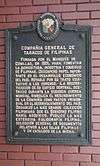Compañía General de Tabacos de Filipinas
The Compañía General de Tabacos de Filipinas was founded by Antonio López y López in Barcelona, Spain in 1881 with the main objective of cultivating, trading, manufacturing, and taking advantage of tobacco from the Philippines. It further expanded its interests beyond tobacco starting 1892 as it engaged in the exploitation of sugar and alcohol distribution, copra, abacá, and maguey.
The company is also credited to have played a role in the setting up of electrical lines and in the establishment of the train system in Manila.
With regards to distribution, the company operated in three markets:
- peninsular.
- European, trading with countries like United Kingdom, Germany, the Netherlands, and Portugal.
- Philippines, the rest of Asia and Oceania.
The National Historical Institute issued a marker along Romualez St. in Ermita, Manila in 1951. The marker commends the company for the important role it played in the economic development in the Philippines and for the company's fair treatment of its workers. It also notes that the reconstruction of its central office after World War II symbolizes the reemergence of the company as a key player in the country's progress. The Compañía General de Tabacos de Filipinas is credited to have organized the largest Filipiniana collection that the Philippine Government has acquired.
